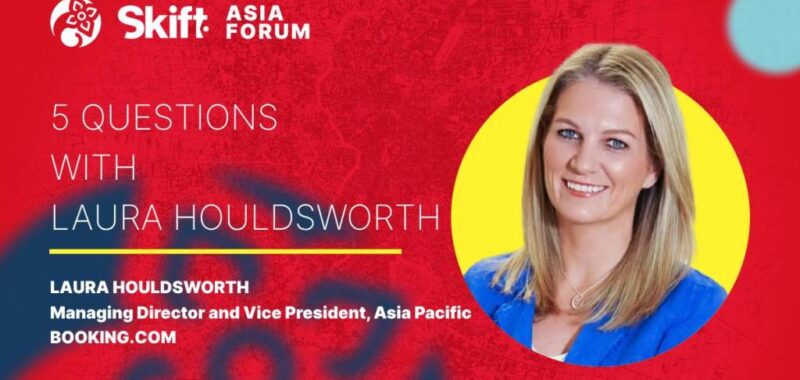With years of experience and a deep understanding of the regionâs diverse needs, Laura is pioneering efforts to make travel more accessible, efficient, and tailored to global visitors.
Ahead of her session at Skift Asia Forum, she shares thoughts on AI innovation, pop cultureâs tourism effect, and the industry’s shift toward more meaningful and sustainable journeys into the region.
Laura Houldsworth said the company is on a mission to make travel accessible for everyone, “however big or small” the experience. She envisions a smarter, more sustainable future for the regionâs travel industry and highlighted Booking.comâs investment in technology to âtake the friction out of travel.”
The platform now offers more than 28 million accommodation listings and is leveraging AI to recommend destinations and stays tailored to individual needs.
She added that Booking.com aims to become a one-stop shop for booking entire trips â from flights to meals â anticipating traveller preferences in real time.
“AI has the potential to evolve into the role of a human travel agent… and proactively provide modifications to itineraries and recommendations that best suit you in a matter of seconds.”
How has ‘The White Lotus’ influenced travel to Southeast Asia?
The latest season of The White Lotus has sparked a travel interest boom in Thailand. âWeâve seen searches for Koh Samui surge more than three-fold*,â said Houldsworth, referring to Booking.com data after the season premiere.
New interest also emerged from countries like Italy and Sweden, showing how pop culture can shape global travel patterns.
She said pop culture acts as a âpowerful travel influencer,â with fans visiting filming locations to “step into the world of the series,” with resorts like Four Seasons Koh Samui seeing increased appeal.
âThe White Lotus features Thailandâs premier wellness facilities and services at the resort, such as health mentors, digital detox bags, and massages, which perfectly align with what todayâs travellers are looking for on their vacations, according to our Travel Predictions 2025 research.â
She said Booking.com’s 2025 research found that 60% of global travellers are keen on longevity retreats, and 58% are willing to pay for vacations that support long-term wellbeing. Travel operators can tap into this trend with themed retreats that capture the White Lotus lifestyle.
*Based on searches made between 16 – 17 Feb 2025 for Koh Samui on Booking.com for check-in dates 1 Jun – 31 Aug 2025 vs the previous year.
âAI is not new to Booking.com,â said Laura Houldsworth. âWe have been experimenting and developing products that leverage AI and machine learning (ML) for over a decade to create more personalized experiences and accurate recommendations.â
She added, âAt Booking.com, our âbuild-firstâ mindset allows us to develop and scale AI-powered solutions and learn along the way. This helps us create solutions that work at scale while keeping our focus on our customers.â
According to Booking.comâs Travel Predictions 2025 research, â49% of travellers in Asia-Pacific are interested in using AI to curate trips, and 72% will use technology to find authentic experiences,â Houldsworth said.
âWeâre constantly examining our entire customer journey to see where we can leverage AI and other technologies to meet the unmet needs of our travellers across the entire end-to-end trip experience.â
She highlighted Booking.comâs recent launches: âOur AI Trip Planner is currently available in Singapore, Australia and New Zealand in the Booking.com app. We also introduced new features like Smart Filter, Property Q&A and Review Summaries to simplify key steps in the planning process.â
Sustainable travel is at the core of Booking.comâs long-term strategy. â85% of Asia-Pacific travellers confirmed sustainable travel is important to them,â Houldsworth shared.
She said the company wants to make greener choices easier for travellers and already lists over 16,500 properties with third-party sustainability certifications. âWe aim to have more than 50% of bookings made with us by 2027 to be on more sustainable offerings.â
She added the company is committed to achieving net-zero emissions by 2040, and is actively working with partners and travellers to support a more sustainable future.
âWe want to give customers the ultimate travel experience through a âConnected Tripâ,â said Houldsworth, describing the companyâs vision to let travellers plan, book, and manage their trip in one place.
AI plays a central role. â84% of travellers in Asia agree that AI makes the planning process faster,â she said, and the company is responding with features that personalise and simplify every stage.
Tools like Smart Filter and Property Q&A allow users to express needs in their own words and receive instant, tailored suggestions. âBy experimenting with AI and technology, we aim to reduce and remove the potential frustration points,â she added, âto make the entire travel experience more seamless and stress-free.â
As Southeast Asia reclaims its spot on the global travel map, leaders like Laura Houldsworth are helping set the pace for innovation, sustainability, and growth. Booking.comâs approach of blending AI, culture, and purpose reflects the future-forward thinking needed to accelerate inbound travel across the region.
At Skift Asia Forum, Laura will share more on how Booking.com is unlocking new possibilities for travellers and partners alike. Donât miss this conversation on whatâs next for one of the worldâs most dynamic travel regions.
Get Your Tickets
Skip the FOMO. Join the decision-makers live in Bangkok.

The travel industry’s top event comes to Bangkok.
May 14-15, 2025 – BANGKOK

